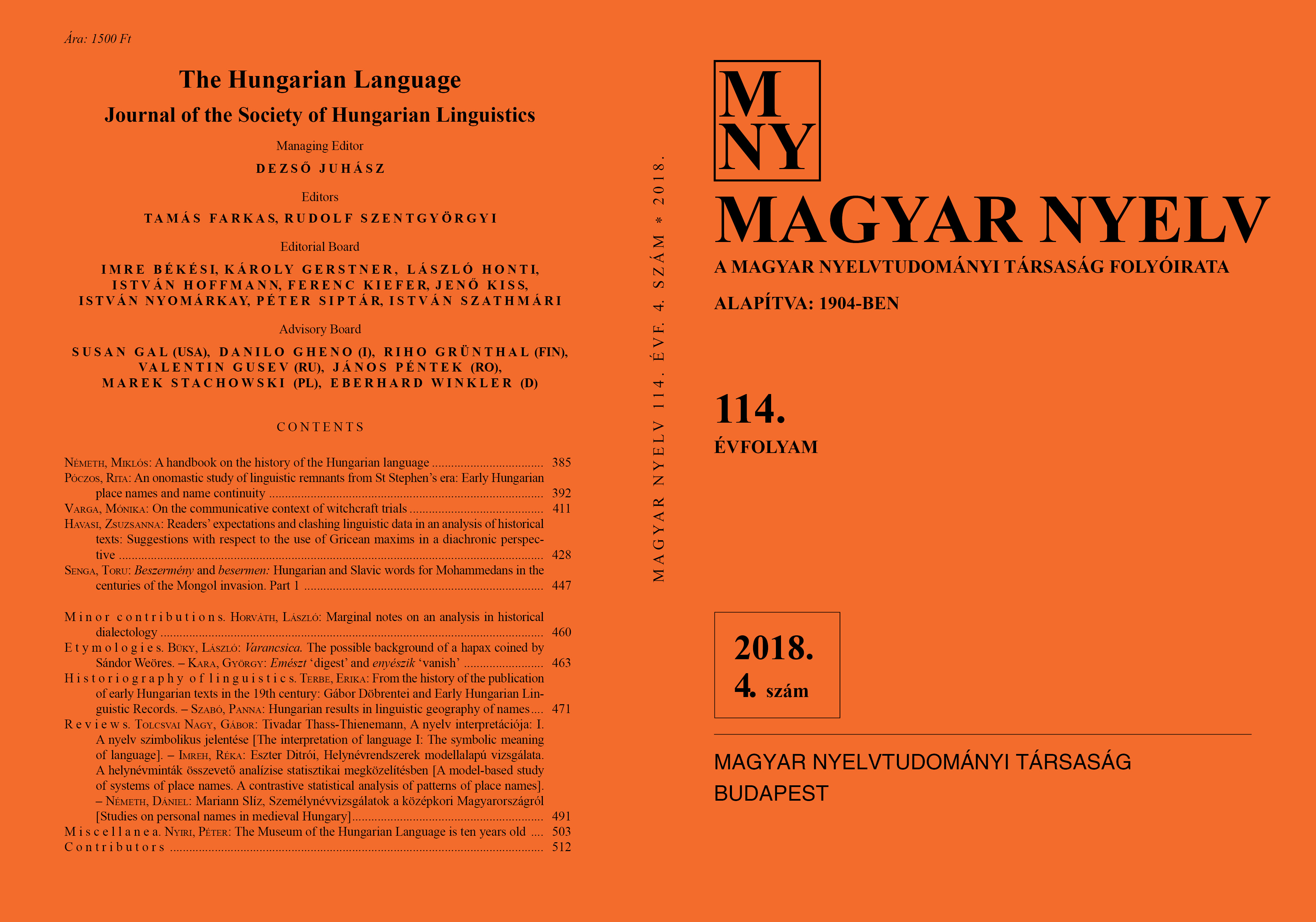From the history of the publication of early Hungarian texts in the 19th century
Gábor Döbrentei and Early Hungarian Linguistic Records
DOI:
https://doi.org/10.18349/MagyarNyelv.2018.4.471Keywords:
Hungarian age of reforms (1825–1848), publication of early Hungarian texts, Hungarian Learned Society, Gábor Döbrentei, Early Hungarian Linguistic Records, principles of source publication, Hungarianization of namesAbstract
The pursuit of independence that was characteristic of the reform age in Hungary foregrounded the issue of language. The Hungarian Learned Society, founded in 1830, gave institutional support to the cultivation of Hungarian: it defined it first and most important task as cultivation of the national language. In 1832 it was decided that latent old manuscripts should be collected so that obsolete Hungarian words and constructions can be rescued and revealed. It was decided that manuscripts hidden in Hungarian libraries should be found, original documents should be collected and published in sourcebooks in order to make a thorough exploration of the history of Hungary possible. The collected documents were first published in a series of volumes entitled Early Hungarian Linguistic Records. Gábor Döbrentei was appointed compiler and editor of the series in 1934. Volume One was published in 1838, Volume Two in 1840, and Volume Three in 1842. The last two volumes were completed and published in 1888 by György Volf. The way those early texts were presented, the principles of text processing are still pertinent today, even though errors do occur in the texts. The appreciation of Gábor Döbrentei (1785–1851), former secretary general of the Hungarian Academy of Sciences, literary organizer, translator, and writer, is equivocal within the history of Hungarian literature. His most renowned accomplishment is his share of the collection of early Hungarian documents; but he was also active as a language reformer: he coined a large number of new words and had an important role in the Hungarianization of geographical names of the hilly area around Buda.
Downloads
Published
Versions
- 2018-12-12 (2)
- 2018-12-12 (1)
Issue
Section
License
Copyright (c) 2024 Erika Terbe

This work is licensed under a Creative Commons Attribution-NonCommercial-NoDerivatives 4.0 International License.
Magyar Nyelv is a Diamond Open Access periodical. Documents can be freely downloaded and duplicated in an electronic format, and can be used unchanged and with due reference to the original source. Such use must not serve commercial purposes. In the case of any form of dissemination and use, Hungarian Copyright Act LXXVI/1999 and related laws are to be observed. The electronic version of the journal is subject to the regulations of CC BY-NC-ND (Creative Commons – Attribution-NonCommercial-NoDerivatives).
The journal permits its authors, at no cost and without any temporal limitation, to make pre-print copies of their manuscripts publicly available via email or in their own homepage or that of their institution, or in either closed or free-for-all repositories of their institutions/universities, or other non-profit websites, in the form accepted by the journal editor for publication and even containing amendments on the basis of reviewers’ comments. When the authors publicize their papers in this manner, they have to warn their readers that the manuscript at hand is not the final published version of the work. Once the paper has been published in a printed or online form, the authors are allowed (and advised) to use that (post-print) version for the above purposes. In that case, they have to indicate the exact location and other data of the journal publication. The authors retain the copyright of their papers; however, in the case of an occasional secondary publication, the bibliographical data of the first publication have to be included.



